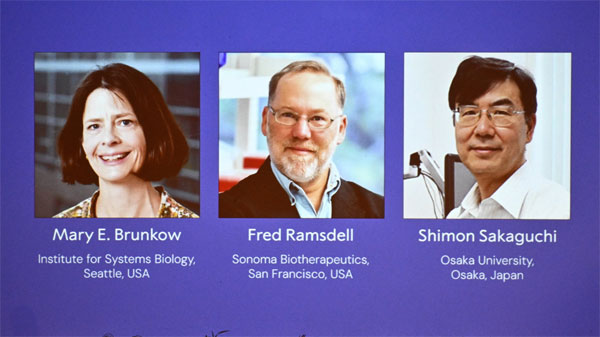Daijiworld Media Network - New Delhi
New Delhi, Oct 6: The 2025 Nobel Prize in Physiology or Medicine has been awarded to American scientists Mary E. Brunkow and Fred Ramsdell, along with Japanese immunologist Shimon Sakaguchi, for their pioneering work on how the immune system regulates itself to prevent attacking the body.
Announced by the Nobel Assembly at Karolinska Institutet, the laureates will equally share the prize money of 11 million Swedish kronor for uncovering the critical role of regulatory T cells, often described as the immune system’s “security guards.” These cells maintain peripheral immune tolerance, a vital mechanism that stops immune cells from launching attacks against the body’s own tissues.

Their groundbreaking discoveries have not only deepened scientific understanding of immune system function and autoimmune disease prevention but also paved the way for novel treatments in cancer, autoimmune disorders, and improved outcomes for organ transplants. Several therapies inspired by their research are currently undergoing clinical trials worldwide.
Olle Kämpe, chair of the Nobel Committee, emphasized the importance of their work, stating, “Their discoveries have been decisive for our understanding of how the immune system functions and why we do not all develop serious autoimmune diseases.”
Mary E. Brunkow, born in 1961, earned her doctorate from Princeton University and currently serves as Senior Programme Manager at the Institute for Systems Biology in Seattle. Fred Ramsdell, born in 1960, holds a Ph.D. from UCLA and is a Scientific Advisor at Sonoma Biotherapeutics in San Francisco. Shimon Sakaguchi, born in 1951, received his M.D. and Ph.D. from Kyoto University and is a Distinguished Professor at Osaka University’s Immunology Frontier Research Center.
This year’s award follows the 2024 Nobel Prize in Physiology or Medicine, which honored Victor Ambros and Gary Ruvkun for discovering microRNA and its crucial role in gene regulation.